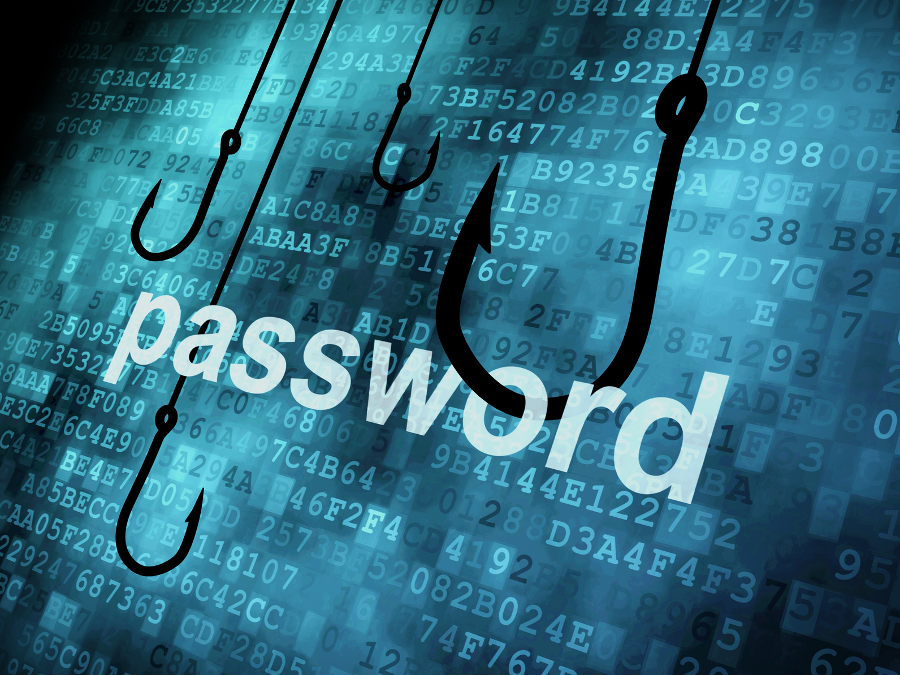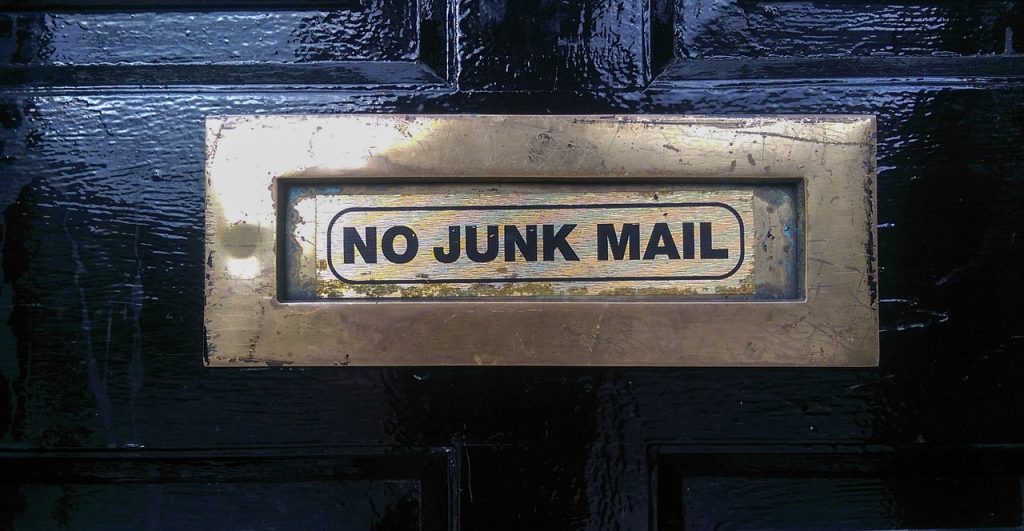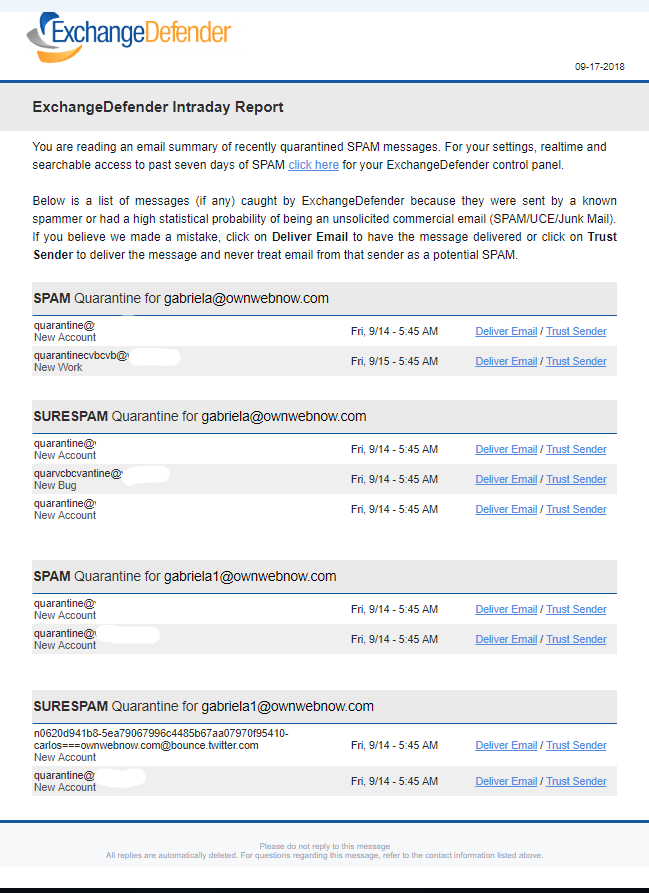ExchangeDefender Introduces New SPAM Reports
SPAM Email Reports
ExchangeDefender SPAM Email Reports remain one of our most popular features and after nearly 6 years since the last major revision we’re looking to improve both the value and the functionality. For many of our end users, ExchangeDefender is the sole provider of cyber security training and information – so the responsibility of better educating our clients on the threats they are likely to face via email and web is crucial.
Then there is the look and feel of it. White collar workforce has largely gone away from dual monitor configurations to smaller portable devices on which users don’t spend the whole day in Outlook – so our email reports that were designed for the Microsoft desktop era needed a little face lift.
New ExchangeDefender SPAM Email Reports are launching on October 1st 2018 and we’ve made several significant changes to the look and feel based on user feedback.
– New reports feature “friendly” From addresses, instead of the actual From: line we’ve always used.
– Contrast has been improved as well as spacing, so finding information in the email is much simpler.
– Font size, padding, colors, etc has been modernized as well, allowing the report to look amazing on both small phone screens and large wide-screen computer displays.
On the backend, our reports and email release requests are starting to embed our support at the point of release, making sure our end users get exactly what they are expecting right away. If the message isn’t displaying correctly, or if it cannot be located, or if the message is continuously ending up in the SPAM quarantine even though the user believes they whitelisted it (99.999999999% they whitelist the disposable from tracking email which changes every time a message is sent, instead of whitelisting the domain) – our support will be there to assist them immediately without picking up a phone, without opening up a support ticket, without escalating it to the office manager or creating additional work. On demand service #ftw.
Our mission to help protect our clients from dangerous and malicious content also has to account for threats before they become problems – which is why we’re investing in training and info collateral aimed at the users so they are aware of new ways hackers are trying to exploit them. This info will be featured prominently in the service and we will cover it in detail as we ramp up production but for the time being we understand our end users have limited time and limited interest in what is going on in the world of cyber crime – so we will limit our content to 140 characters and feature relevant stuff only, nothing commercial.
If you have any suggestions or ideas for our Email SPAM Reports, please do not hesitate to let us know.
How to Market Email Security Solutions

We’ve had the opportunity to spend quite a bit of time with our top small business partners over the summer as they hold meet & greets / lunch & learns while kids are out of school and staff takes vacations. We got to see firsthand how the features and the problems are both the same as they have always been (budget, buy-in) and completely different in a way that technology solves business problems – cloud compliance, vendor/mobility management. One of the businesses that moved to ExchangeDefender was able to get rid of 7 (seven!!) different vendors involved in email & mobility solutions alone.
It’s all about the Story.
ExchangeDefender is increasingly becoming the modular security solution that can help service your mobile & security needs end to end. From email hosting to support for everything that entails, from managing mobile devices to assuring their compliance, archiving, business continuity and data management – ExchangeDefender does it all from a single pane of glass. All you have to do is change the way you tell the story.
Product vs. Service
Typically, small business partners follow the same “vendor” approach to positioning ExchangeDefender “we kill SPAM for a living” and then mention the other nice “bonus” features we offer. While that may work on larger companies with CIOs where a point solution is necessary (or required for redundancy), in small business you need more finesse as you introduce our solution as the Swiss knife for typical SMB problems. Small business decision makers typically aren’t that interested in technology specs, even if they are familiar with the problems, they are looking at the price and at the time this the solution is going to take away.
So here is what works for us:
We position ExchangeDefender as a service (not even mentioning the cloud) that takes care of keeping junk out of the mailbox, keeping people productive and safe, making sure any outages have a workaround and as needed we also do encryption to protect data automatically and compliance archiving to help meet regulatory requirements and keep fines away – and we build, manage and support 100% of it end to end. In a way, we’re the last security product you need to look at and the only one you need to contact when there is a problem.
Give it a shot – this is fully compliant with the Elevator Pitch™ guerrilla marketing and truly disarms the most common objection in SMB which is “we already have something” – everyone has something, they just don’t know where it is, who does it, how it’s used and what it does – and that’s the biggest selling point of ExchangeDefender. You don’t have a dozen vendors for email, mobile, security, archiving, compliance, encryption, DDoS protection, business continuity, mobile device wipes, etc, etc you get the picture. Instead of going in and trying to sell yourself, you’re going in and looking at ways to save them money “Well, you won’t need to renew this product, or this service, your old firewall won’t have to be upgraded, you now get all the additional features, etc”
In a way, our go to market has been the same as it’s always been – but with the cloud you’re dealing with small businesses with data all over the place and providing security to a mobile organization with decentralized storage is no longer a “security” pitch, it’s a management pitch that gives them back their time.
ExchangeDefender Support: Enhanced Security and Password Management

Password Policies
You’ve seen us blog endlessly about improved security that is being rolled out with all the brand new features across our entire product and service portfolio. Trust us, this is not a simple process of just changing the password complexity requirements, people hate password changes and for the most part have become predictable in what their current and next password will be. Add to it the fact that almost everyone uses the exact same password all over the web and not a single day passes by without at least one major provider having a data breach. Sometimes it becomes comical – even LifeLock had a security issue today where they exposed a bunch of data and had to take their site offline!
So passwords suck and short of using our One Time Password / Two Factor Authentication service, it’s going to remain that way. The cool thing about ExchangeDefender, and all of our service, is that we’re going to help you better manage security and password expiration so that your users and services can remain protected and still user friendly.
New password policy at ExchangeDefender, for all of our services going forward, will be a required mixture of upper case, lower case, numbers and special characters with minimum length of 9 characters.
That is just the beginning. Some services will require a transparent OTP/2FA using your email address or cell phone as an additional real-time identity verification process. If you are about to make a large-scale change, we want to make sure it’s you and not just someone that got your password. Calling in will now require PIN or txt verification as will any service request changes – the cool thing is, if you can provide us with that information we can do just about everything you want or need through phone and chat.
The reality of security on the web is that it’s as weak as the laziest user – and it only takes one careless one to mess up the entire organization. We are on your side, we are on your team – that’s why you hire ExchangeDefender – so we’re stepping things up in terms of support and management functionality to help identify, train, and assist users when they run into an issue. Passwords and password changes may continue to suck until the end of time – but we are currently making huge changes in the way we handle support in order to help our partners and CIO’s become more productive by letting us both better secure and support users.
Looking for a way to spend less time on email/client support ?
Not growing as fast as you’d like, or spending too much time on email/client support? Hear our CEO’s thoughts on what is fueling our growth and how ESS is already playing a huge part in growth of managed services across our client base.
VIDEO: Live Archive keeps emails up, and running!
So here is something that has always worked for me: everyone hates outages. Regardless of why I’m invited to speak to anyone about ExchangeDefender, and the billion problems we solve, I am here to help you with just one thing: uptime. If things are working, we can sort everything out, but the fear of the new unknown solution causing downtime is the #1 thing your client is thinking about. So address it first.
Posted by ExchangeDefender on Thursday, March 29, 2018
What’s this video about? Live Archive.
So here is something that has always worked for me: everyone hates outages. Regardless of why I’m invited to speak to anyone about ExchangeDefender, and the billion problems we solve, I am here to help you with just one thing: uptime. If things are working, we can sort everything out, but the fear of the new unknown solution causing downtime is the #1 thing your client is thinking about. So address it first.
What is Live Archive?
Access your email via the cloud when outages happen.
Organizations are constantly facing internet and email outages, maintenance cycles and service unavailability. The key to productivity is being able to access your email even when outages happen Exchange Defender LiveArchive Business Continuity is the solution.
As you send and receive email, we make a copy and store it on our network – when you experience an outage you can just pull up a webmail system on your computer, tablet, or phone and continue where you left off.
Visit Exchange Defender: Email Security, Archiving, and Business Continuity solutions
Why is there suddenly a heavy demand for Encryption?
What is behind the growth in the adoption of email encryption?
Over the past year we’ve seen an explosion in sales of ExchangeDefender Email Encryption – which is a surprise given that we’ve not only had it for years but that we’ve also given it away for free. HIPAA has been around for over 20 years, dozens of other regulations that almost all companies ignore have been gone for just as long – so why now?
In one word: penalties.
Companies have long known that they can’t operate efficiently without email – and that they cannot just move files around “just to get it to them” once they see the penalties. But selling a service to someone that has avoided using or paying for it is never an easy discussion so here are the 3 quick questions that should lead you to an effective pitch in under 1 minute:
1. Who sends you encrypted messages?
2. Who could get hurt if this information went public?
3. What is your exposure? How much negligence insurance do you have?
The more they mumble, the more of those questions they cannot answer, the more details or costs or scope they don’t understand, the more they need it. End your question with this line: How comfortable would you be having this conversation in a legal deposition?
Elevator pitch: How to position ExchangeDefender Encryption as an answer to all of the above problems
→It is included in your ExchangeDefender Pro subscription and it’s transparent – no software to install, nothing to manage or configure.
→ You’ll be using the same process and same security major banks, health care providers and lawyers use – so you’ll be protected from most critical security exploits.
→ Finally, it’s dead simple to use – all your employees need to do is put [ENCRYPT] in the subject when they are sending the message. Doesn’t matter if it’s on the phone our Outlook or Outlook Web Access, it just works.
Ding. You’re done. It’s virtually impossible not to sell this service – and it’s desperately needed by anyone using email to do business or conduct confidential discussions. One more thing: Because encryption is transparent and on demand in the cloud, it also protects you when the security issue is on the recipients end – because email is never stored on their PC or device, if someone hacks their network they won’t be able to get to the info stored in your encrypted message!
If email is a business necessity then email encryption is it’s insurance policy.
If you discuss business over email, then anything confidential that should be in that email should be a matter of employee communication protocol: If you attach something sensitive to this message, you better encrypt it and CYA. This is the way things go at banks, with lawyers, with accountants, with realtors and at nearly every white collar job: Nobody wants to assume the liability so they’ll all do what it takes to protect the data.
And with high profile hacks and compromises in the news daily, is not having it worth risking the whole company?






